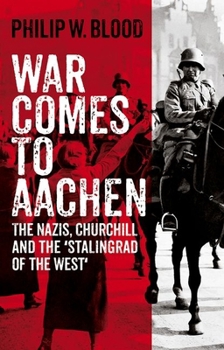War Comes to Aachen: The Nazis, Churchill and the 'Stalingrad of the West'
This book narrates the tumultuous era of total war through the fate of Aachen--Imperial Germany's seat of power for 600 years, site of Charlemagne's coronation as Holy Roman Emperor, and a place with greater geopolitical significance for Adolf Hitler in 1944 than Stalingrad in 1943. This was a stark contrast with the events of the Great War: in 1918, the Imperial German Army had abandoned Aachen in a rout-like flight. In the Nazi period, however, Aachen became a major symbol of Germany's defiance against the Allies. For Hit-ler--his mind warped after surviving the Stauffenberg bomb plot--Germany's westernmost city became pivotal in his last-ditch defence of the 'thousand-year Reich'. War Comes to Aachen weaves together the city's story from 1900, tracing its entrenched Catholic orthodoxy, its growth as an industrial urban centre, the demise of democracy, the rise of Na-zism, the two world wars, and the Holocaust. The book surveys Churchill's wartime leadership and the destruction of pre-war Aachen through the lenses of military history and the anthropol-ogy of aerial bombing. Philip W. Blood's absorbing history con-cludes with Allied efforts to reshape German society after 1945, and with the use of remembrance as a means of socio-political control.
Format:Hardcover
Language:English
ISBN:1911723693
ISBN13:9781911723691
Release Date:December 2024
Publisher:Hurst & Co.
Length:400 Pages
Weight:1.40 lbs.
Dimensions:1.6" x 5.7" x 7.9"
Related Subjects
HistoryCustomer Reviews
0 rating





